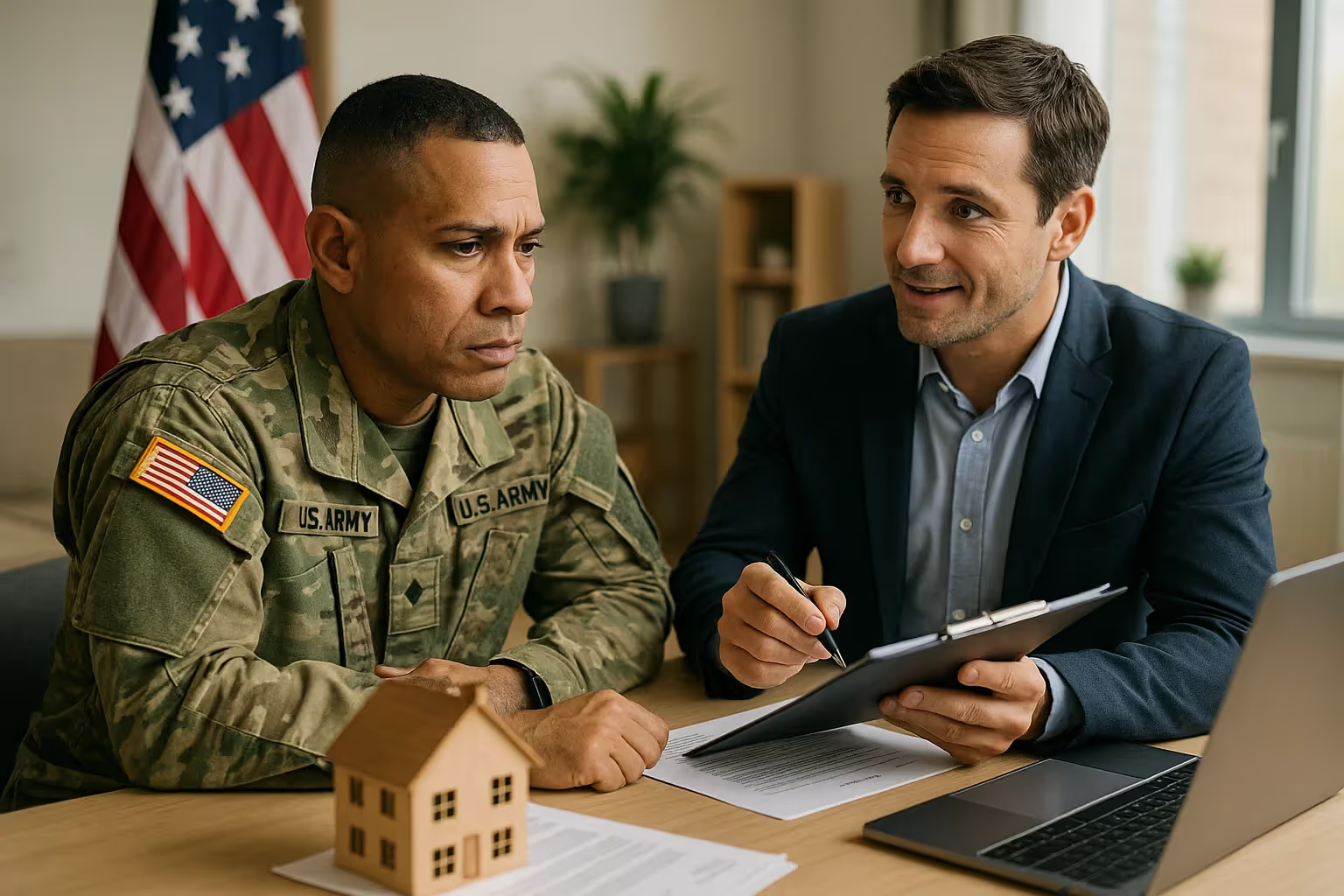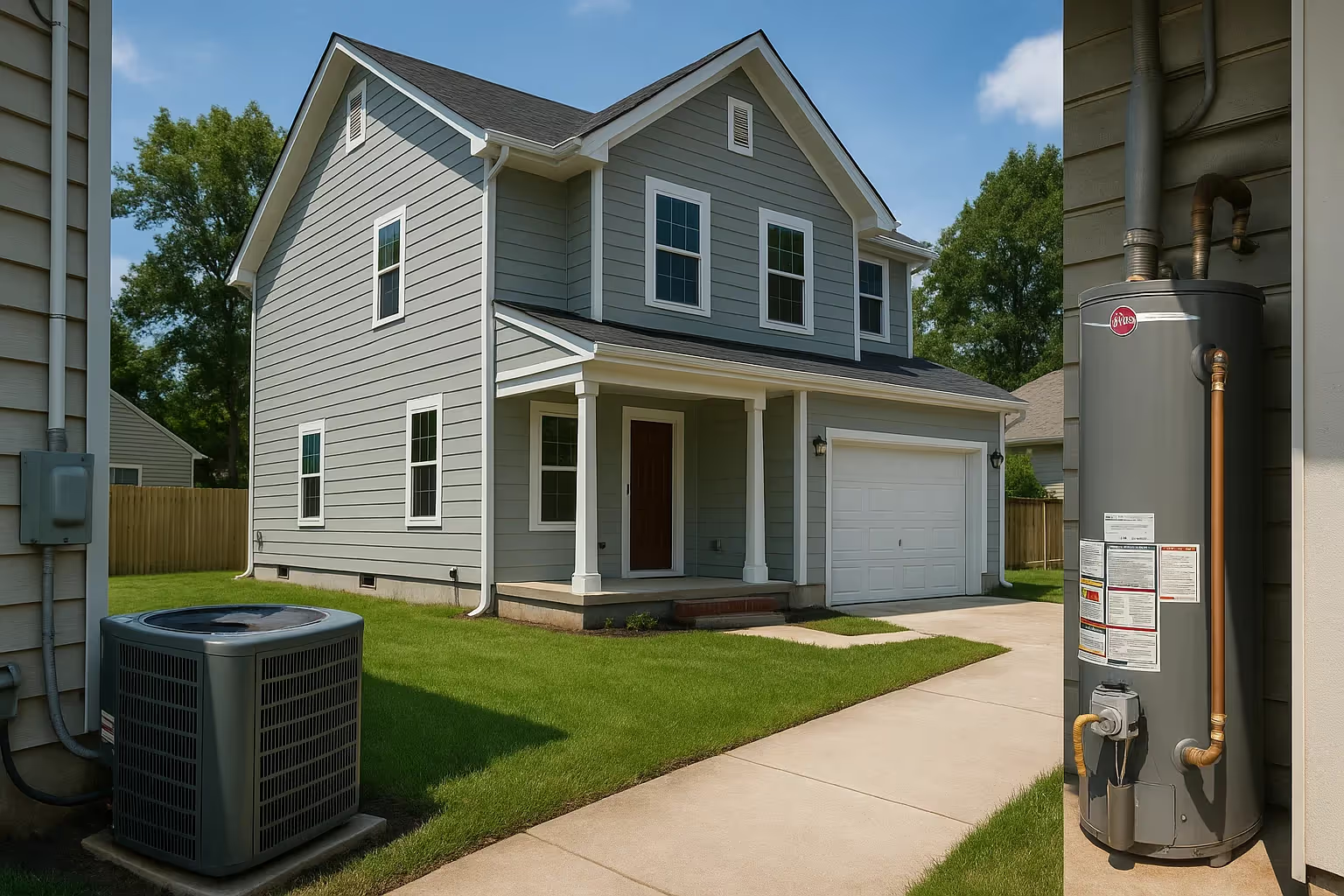VA Loan Property Types and Location Requirements: Your Complete Guide to Eligible Options
November 19, 2025
.avif)
Understanding eligible property types for VA loans helps military families optimize their homeownership benefits across different housing scenarios, from VA condo approvals to Army VA home loan applications. While VA loans restrict second home purchases, knowing which property types qualify and location-based requirements ensures veterans and surviving spouses can maximize their benefits within program guidelines. This comprehensive guide examines all aspects of VA property eligibility to help military borrowers make informed real estate decisions.
Are you wondering which types of properties qualify for VA loan financing, or confused about why you can't use these benefits for a second home purchase? Many military families don't understand the specific property types eligible for VA financing, the complex condo approval process, or how Army and other service branch programs integrate with property requirements. Today we'll explore every aspect of VA property eligibility, from single-family homes through condominiums, examine the restrictions that prevent second home financing, and discuss how surviving spouse benefits apply to different property types. Whether you're an active-duty Army soldier or a military widow, understanding these requirements will help you make the best use of your earned benefits.
Eligible VA Loan Property Types and Classifications
VA loans finance several specific property types that meet Department of Veterans Affairs standards for safety, structural soundness, and habitability. Single-family detached homes represent the most common eligible property type, providing traditional homeownership opportunities with full VA loan benefits including zero down payment and no private mortgage insurance requirements.
Multi-unit properties up to four units qualify for VA financing when veterans occupy one unit as their primary residence, allowing rental income from additional units to supplement debt-to-income calculations. Townhouses and row houses with individual ownership of both structure and land typically qualify, provided they meet VA Minimum Property Requirements (MPRs) for safety and habitability.
Manufactured homes meeting HUD standards can be financed through VA loans when permanently affixed to foundations and classified as real property rather than personal property. Mobile home communities and individual lots with manufactured homes require specific documentation proving permanent installation and compliance with local building codes.
VA Condo Approval Process and Requirements
VA condo approval requires project-level approval by the Department of Veterans Affairs rather than individual unit approval, with approved condominium lists maintained by VA and updated regularly based on project compliance with financial and legal standards. Homeowners Association (HOA) financial health becomes crucial, with requirements for adequate reserves, low delinquency rates, and appropriate insurance coverage protecting both unit owners and VA loan guaranty interests.
New condominium developments can apply for VA approval through comprehensive documentation processes including HOA financial statements, legal structure review, and project compliance verification that may take several months to complete. Established projects with strong financial performance and appropriate governance structures typically qualify more easily than conversion projects or developments with financial challenges.
Commercial space limitations within condominium projects typically restrict non-residential usage to 25% or less of total project square footage to maintain residential character and VA approval eligibility. Owner-occupancy requirements for VA-approved projects ensure stable residential communities while protecting property values and loan performance.
VA Loan Second Home Restrictions and Limitations
VA loan second home purchases are strictly prohibited under Department of Veterans Affairs regulations, with primary residence requirements mandating that all VA-financed properties serve as the borrower's principal place of residence. Vacation homes, seasonal residences, recreational properties, and investment properties purchased solely for rental income cannot be financed through VA loan programs.
Occupancy requirements mandate that veterans move into VA-financed properties within 60 days of closing and maintain primary residence status for the majority of each year. Temporary relocations for employment, military orders, or family circumstances don't typically violate occupancy requirements when properly documented and legitimately temporary.
Rental property conversions from former primary residences remain acceptable after initial occupancy compliance, allowing veterans to build rental income portfolios while using remaining entitlement for new primary residence purchases. Military relocations due to Permanent Change of Station (PCS) orders or deployment requirements specifically exempt veterans from occupancy violations when converting properties to rentals.
Army VA Home Loan Integration and Service-Specific Benefits

Army VA home loan programs integrate seamlessly with standard VA loan benefits available to all military service branches, providing identical loan terms, funding fee structures, and property eligibility requirements regardless of the veteran's specific military branch. Army National Guard and Army Reserve veterans qualify under standard VA eligibility provisions based on total creditable service rather than active-duty requirements exclusively.
Combat-related service may provide enhanced benefits or expedited processing for Army veterans who died in combat or suffered service-connected disabilities, though property type eligibility remains consistent across all service branches. Military Occupational Specialty (MOS) considerations don't affect property type restrictions but may influence location preferences and career transition planning for real estate investments.
Army Community Service Centers provide specialized counseling and homebuying education that complements standard VA loan benefits while helping Army families navigate property selection, location considerations, and long-term homeownership planning. Installation housing offices often maintain local market information and community resources supporting Army families' homebuying decisions.
VA Loan for Surviving Spouse Property Considerations
VA loan for surviving spouse benefits extend to all eligible property types available to veterans, including single-family homes, approved condominiums, manufactured homes, and multi-unit properties meeting occupancy requirements. Primary residence mandates apply equally to surviving spouses, preventing second home or vacation property financing through VA loan programs.
Surviving spouse eligibility for VA-approved condominiums follows identical approval processes and project requirements as veteran applications, with no additional restrictions or special considerations based on surviving spouse status. Property type flexibility helps surviving spouses downsize, relocate closer to family, or adjust housing to meet changed life circumstances.
Occupancy timing for surviving spouses may receive additional flexibility when dealing with estate settlements, family relocations, or other transition challenges, though primary residence requirements remain fundamentally unchanged from standard VA loan provisions. Professional support through VA-approved lenders familiar with surviving spouse circumstances helps navigate unique timing and documentation challenges.
VA Minimum Property Requirements (MPRs) Overview

VA Minimum Property Requirements ensure all financed properties meet safety, structural soundness, and sanitary standards that protect both veterans and VA loan guaranty interests. Year-round access requirements mandate independent property access that doesn't rely on neighbors' cooperation and adequate space between buildings for exterior maintenance and emergency access.
Mechanical systems must be appropriately sized, in good working condition, and properly exposed for maintenance and safety inspections. Electrical systems require adequate capacity for lighting and necessary equipment with no visible frayed or exposed wiring that could create fire hazards or safety risks for occupants.
Water supply systems whether municipal or well-based must provide continuous safe drinking water with adequate hot water heating capacity. Heating systems must maintain temperatures of at least 50 degrees Fahrenheit in areas with plumbing, though air conditioning is not required unless already installed and must function properly when present.
Geographic and Regional Considerations
VA loan limits vary by county and metropolitan area, with 2025 conforming limits of $806,500 in most areas and up to $1,209,750 in high-cost regions, affecting maximum borrowing capacity for expensive property markets. Rural property eligibility includes manufactured homes, agricultural properties with residential components, and properties with substantial acreage provided they meet primary residence requirements.
Condominium availability varies significantly by geographic region, with limited VA-approved projects in some rural areas and extensive options in metropolitan markets with established condominium developments. Regional building standards and local regulations may affect property eligibility and MPR compliance depending on specific location requirements.
Military installation proximity doesn't affect property type eligibility but may influence resale values, rental demand, and long-term investment potential for military families considering future relocations or property conversions. State-specific benefits including property tax exemptions for veterans may provide additional value that complements federal VA loan advantages.
Professional Support and Decision-Making Resources
VA-approved appraisers conduct mandatory property assessments that verify both market value and MPR compliance, potentially identifying required repairs or property deficiencies that must be addressed before closing. Real estate agents with military family experience understand property type restrictions, timing challenges, and unique circumstances affecting military homebuyers.
Legal assistance through military legal assistance offices or veteran service organizations can help resolve property eligibility questions, contract issues, and complex circumstances affecting property qualification. Financial counseling through VA-approved housing counseling agencies provides education and guidance on property selection, budgeting, and long-term homeownership planning.
Understanding VA loan property types and location requirements enables military families to make informed decisions that maximize their earned benefits while avoiding restrictions that could complicate homebuying or limit future flexibility in real estate planning and investment strategies.

Alex Chen

Alex Chen













Get in touch with a loan officer
Our dedicated loan officers are here to guide you through every step of the home buying process, ensuring you find the perfect mortgage solution tailored to your needs.
Options
Exercising Options
Selling
Quarterly estimates
Loans
New home

Manténgase siempre actualizado sobre artículos y guías interesantes.
Todos los lunes, recibirás un artículo o una guía que te ayudará a estar más presente, concentrado y productivo en tu vida laboral y personal.





.png)
.png)
.png)
.avif)
.avif)
.avif)
.png)
.png)
.png)
.avif)
.png)
.png)
.avif)
.png)
.avif)
.png)
.avif)
.avif)
.avif)
.avif)
.avif)
.avif)